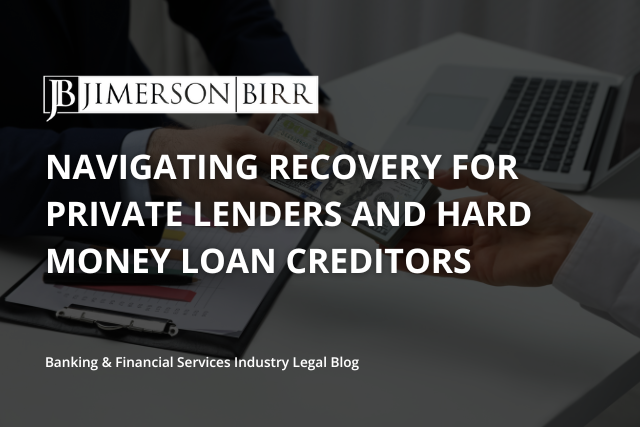What to Know About Judicial Foreclosure, Creative Recovery Strategies, and Debt Collection Risks in Florida
Florida offers robust opportunities for private lenders, but default scenarios are legally complex. A core concept is that Florida follows the lien theory of mortgages. The borrower holds title, the lender holds a lien, and recovery proceeds through judicial foreclosure. Traditional foreclosure can be slow. Creative structures may accelerate recovery, but they carry real legal risks under Florida law.
Florida as a Lien Theory State
Borrower Holds Title and Lender Holds a Lien
In Florida, the borrower retains legal title to the real property. The lender holds a lien through a recorded mortgage. Foreclosure requires a suit in equity in circuit court. Nonjudicial foreclosure is not permitted.
Judicial Foreclosure Timeline
Even uncontested cases often take about 180 to 200 days from filing to sale. Contested matters can extend beyond one year. Borrowers receive a response window, often 20 days, followed by litigation, possible summary judgment, and sale preparation.
Equity of Redemption is Strongly Protected
Borrowers retain statutory and equitable redemption rights until the sale is confirmed or title passes. Errors in the proceeding can create a ten day window to challenge the sale.
Deficiency Judgments are Allowed
If the sale proceeds do not satisfy the full debt, lenders can seek a deficiency judgment against the borrower. This is common where loans are with recourse.
Creative Strategies for Accelerated Recovery
Dual Collateral Loans with a UCC Foreclosure of Equity Interests
- Structure: Secure both a mortgage on the real property and a UCC lien on the borrower’s ownership or membership interests, such as interests in an LLC.
- Speed: A private Article 9 sale of pledged equity interests can proceed in roughly 30 to 60 days, with notice periods as short as ten days, and without court oversight.
- Legal Viewpoint: A New York decision in HH Cincinnati held that a UCC equity sale did not clog the equity of redemption because Article 9 provides redemption rights until the sale is executed. Later decisions, including HH Mark Twain, narrowed that comfort and highlighted risk. Florida courts place strong weight on the anti clogging doctrine. The presence of UCC redemption rights may not insulate a lender from clogging challenges in a judicial foreclosure jurisdiction like Florida.
- Next Step: A UCC equity sale does not clear junior liens on the real property. Lenders often still pursue a mortgage foreclosure to confirm title and remove subordinate interests.
Seller Financing, Wraparounds, and Land Contract Models
These approaches can introduce accelerated remedies such as reversionary interests or forfeiture provisions. They must be structured with care. Title issues, due on sale clauses, and trust or escrow arrangements must be addressed to avoid claims of improper evasion of foreclosure.
Hard Money Terms and Enforceable Covenants
Balloon payments, assignments of rents, bad boy guaranties, and other negotiated default triggers can provide leverage that does not always require a full foreclosure to obtain relief. Ultimate recovery commonly still runs through the courts, so documents must be drafted with precise notices and cure mechanics.
Legal Risks and Key Considerations for Lenders
Clogging the Equity of Redemption
Florida courts strongly guard the equity of redemption. Any structure that fixes, restricts, or effectively eliminates the right to redeem before sale can be challenged. The dual collateral approach remains legally unsettled in Florida. HH Cincinnati provides support under New York law, but HH Mark Twain underscores ongoing risk in jurisdictions like Florida that require judicial foreclosure.
Self Help Under the UCC
Article 9 permits nonjudicial repossession of personal property collateral only if it does not breach the peace. Forced entry, confrontation, or similar conduct can create lender liability and undermine recovery.
Usury, Licensing, and Compliance
Florida law caps certain interest rates and may impose licensing requirements even for private lenders. Noncompliance risks include voiding of interest, penalties, fee forfeiture, and borrower claims.
Good Faith and Fair Dealing
Florida implies a covenant of good faith and fair dealing in contracts. Aggressive or opaque enforcement that departs from clear contract terms can invite claims of unfair, deceptive, or abusive practices.
The Bottom Line
Florida’s lien theory regime, with judicial foreclosure and strong redemption rights, requires careful planning. Creative approaches such as dual collateral pledges, seller financing variations, and negotiated covenant packages can accelerate recovery, but only when implemented with legal precision and full disclosure.
At Jimerson Birr, we help private lenders and hard money creditors strike that balance. We structure dual collateral and equity pledge arrangements that anticipate anti clogging challenges. We design enforceable remedies that combine UCC sales with fallback foreclosure strategies. We draft loan documents with clear default triggers, notice protocols, and compliance with usury and licensing rules. And when disputes arise, we defend lenders against borrower claims of clogging, bad faith, or predatory practices.
If you want a document review or a dual collateral template that balances speed with enforceability and risk mitigation, contact Jimerson Birr today.

